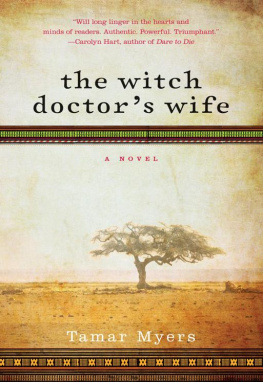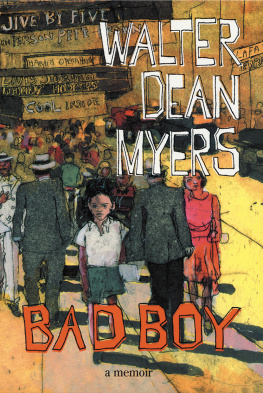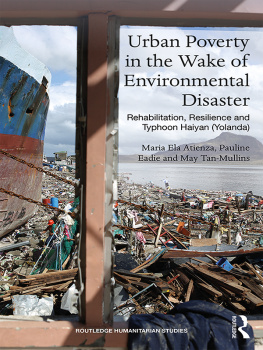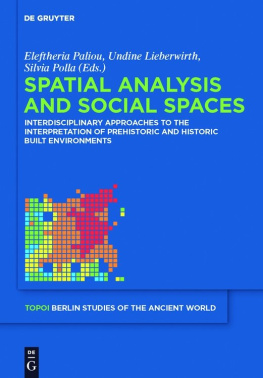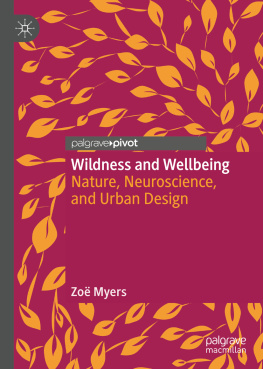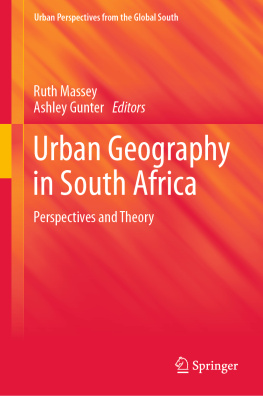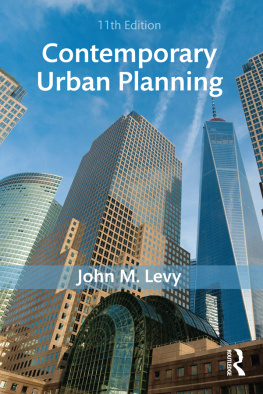URBAN ENVIRONMENTS
IN AFRICA
A critical analysis of
environmental politics
Garth Myers
First published in Great Britain in 2016 by
Policy Press University of Bristol 1-9 Old Park Hill Bristol BS2 8BB UK Tel +44 (0)117 954 5940 e-mail
North American office: Policy Press c/o The University of Chicago Press 1427 East 60th Street Chicago, IL 60637, USA t: +1 773 702 7700 f: +1 773-702-9756
Policy Press 2016
British Library Cataloguing in Publication Data
A catalogue record for this book is available from the British Library
Library of Congress Cataloging-in-Publication Data
A catalog record for this book has been requested
ISBN 978-1-4473-2292-4 paperback
ISBN 978-1-4473-2291-7 hardcover
ISBN 978-1-4473-2295-5 ePub
ISBN 978-1-4473-2296-2 Mobi
The right of Garth Myers to be identified as author of this work has been asserted by him in accordance with the Copyright, Designs and Patents Act 1988.
All rights reserved: no part of this publication may be reproduced, stored in a retrieval system, or transmitted in any form or by any means, electronic, mechanical, photocopying, recording, or otherwise without the prior permission of Policy Press.
The statements and opinions contained within this publication are solely those of the author and not of the University of Bristol or Policy Press. The University of Bristol and Policy Press disclaim responsibility for any injury to persons or property resulting from any material published in this publication.
Policy Press works to counter discrimination on grounds of gender, race, disability, age and sexuality.
Cover design by Hayes Design
Readers Guide
This book has been optimised for PDA.
Tables may have been presented to accommodate this devices limitations.
Image presentation is limited by this devices limitations.
To all of Gods bits of wood
Contents
List of figures and tables
Figures
Tables
List of abbreviations
| CADD | Cooperative of development non-governmental organizations in Pikine |
| CCM | Chama cha Mapinduzi, or Revolutionary Party, Tanzanias ruling party |
| CCVI | Climate Change Vulnerability Index |
| CFA | Communaut Financire dAfrique (Financial Community of Africa), which produces the CFA franc, the currency of former French colonies of West Africa |
| CFRS | Cape Flats Renewal Strategy |
| CUF | Civic United Front, Zanzibar-based opposition party in Tanzania |
| DRC | Democratic Republic of Congo |
| EIU | Economist Intelligence Unit |
| FEDUP | Federation for the Urban Poor, South Africa |
| IDP | internally displaced persons |
| IPCC | Intergovernmental Panel on Climate Change |
| KDI | Kounkuey Design Initiative |
| LECZs | low-elevation coastal zones |
| MoNMeD | Ministry for Nairobi Metropolitan Development (200813) |
| MOVE | invented acronym of the group, Socio-Ecological Movements in Urban Ecosystems |
| NGO | non-governmental organization |
| PD | Peoples Dialogue, a collaborative movement group in South Africa |
| SAHPF | South African Homeless Peoples Federation |
| SUPE | situated urban political ecologies |
| UN | United Nations |
| UPE | urban political ecology |
| VM | Victoria Mxenge Housing Development Association |
| VPUU | Violence Prevention through Urban Upgrading, a Cape Town program |
| ZATI | Zanzibar Association of Tourism Investors |
Glossary of foreign terms
Abahlali baseMjondolo
(people who live in shacks), the radical shack-dwellers movement in South Africa (Zulu)
Arrondissement
urban administrative level in Senegal; smaller units within each arrondissement are called communes darrondissement (French)
Banlieue
suburb; in Africa, the term often has negative connotations (French)
Bidonville
tin-can town, a term sometimes used for informal settlements (French)
Citimene
rotational bush-fallow agriculture of Zambia (Bemba)
Dambo
a seasonally flooded grassy depression (Chinyanja-Chichewa)
Eka tatu
three acres (Swahili)
Esprits
spirits; local branch units in the Yen a Marre movement in Senegal (French)
Fitina
discord (Swahili)
Fynbos
Sclerophyllous Mediterranean scrub biome of the Western Cape, South Africa (Afrikaans)
Giningi
the Swahili spirit world in Zanzibar
Kibuki
ritual spirit group in Zanzibar
Kusadikika
to make-believe or imagine (Swahili)
Mabonde
lowland wetlands (Zanzibari Swahili)
Matatu
term used for mini-bus in Nairobi
Maweni
stony coral bushlands in Unguja (Zanzibari Swahili)
Miombo
Central African woodland dominated by Brachystegia Isoberlinia and Julbernardia
Mjini
in the city (Swahili)
Munga
Central African woodland dominated by Acacia, Combretum, and Afrormosia
Ngoma
drum or dance; also rituals of affliction (Swahili)
Set/Setal
Be Clean/Make Clean; a Senegalese youth environmental group (Wolof)
Shamba
Zanzibari Swahili term for plantation, farm, or countryside
Uwaba
(from: Umma wa Wapanda Baisekeli, or Bicycle Riders Society), a bicycling and environmental activist group in Dar es Salaam.
Uwanda
grassland and low bush country of Unguja (Zanzibari Swahili)
Yen a Marre
Enough Is Enough; We Are Sick of It; a Senegalese movement (French)
Note on the author
Garth Myers is the Paul E. Raether Distinguished Professor of Urban International Studies at Trinity College, Hartford, CT, USA. He is director of the urban studies program and a member of the international studies program. He is the author of three other books on urban Africa and co-editor of two other volumes; he has also published more than 60 articles and book chapters.
Acknowledgments
When I began to think about and write this book in 2012, I called it my tree book. I felt that not enough had been written about trees, and nature more broadly, in cities of sub-Saharan Africa. I would jokingly tell people that I wanted to get away from always writing about political things in urban Africa. I could have chapters on dirt, water, air, and animals to go along with the trees (And I thank Morten Nielsen for that idea!). But of course, I knew, from the beginning, even the treesalong with the dirt, water, air, and animalsare political in the cities of Africa, as they are anywhere, even (or maybe especially) in the cities of Connecticut, where I live, or Pennsylvania (Penns Woods, after all), where I grew up. I also became steadily humbled by the staggering productivity of my world of colleagues studying urban Africa and its environments. Carlos Nunez Silva at the University of Lisbon, creator of the African Urban Planning Research Network (AUPRN), deserves specific mention in this regard. AUPRN has proved an invaluable source of information on the growing wealth of research relevant to urban environments in Africa. The African Centre for Cities at the University of Cape Town should also be highlighted in this same regard as arguably the continents finest center for urban research, along with the Langaa Research & Publishing Common Initiative Group in Bamenda, Cameroon, whose publications have been quite inspirational.




